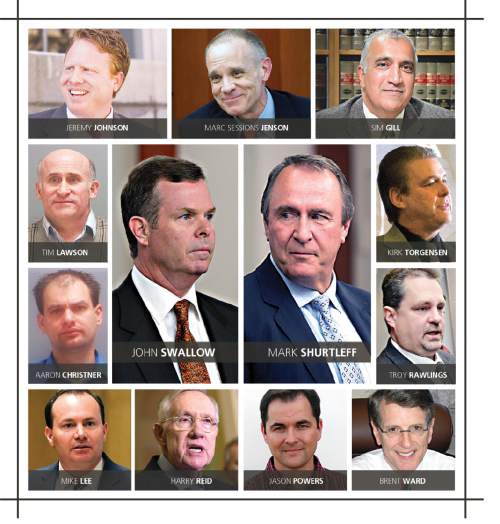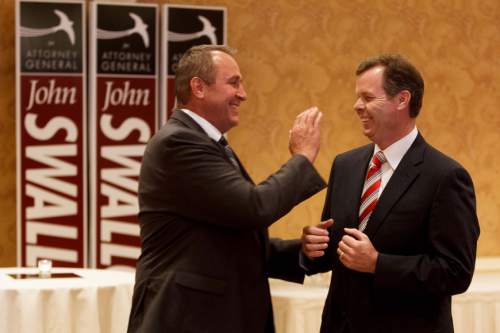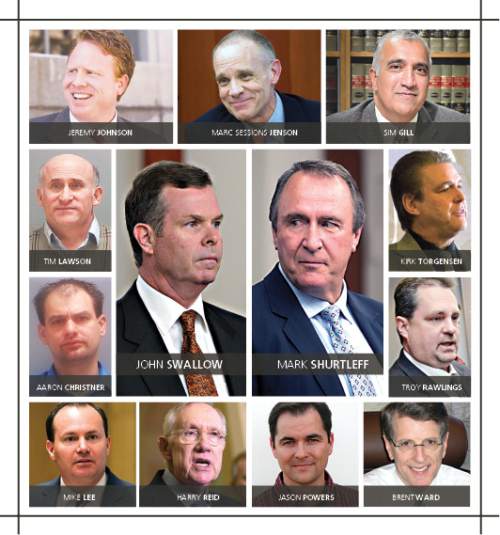This is an archived article that was published on sltrib.com in 2015, and information in the article may be outdated. It is provided only for personal research purposes and may not be reprinted.
The largest political scandal in Utah history exploded into the headlines in January 2013, a mere five days after John Swallow took the oath as Utah's attorney general.
Now — nearly three years, dozens of court hearings, hundreds of news stories and thousands of investigative documents later — he and his predecessor, Mark Shurtleff, are awaiting trials on multiple criminal charges.
So where do these complex prosecutions — and related cases — stand? What are the major players doing? The following snapshots provide an update:
John Swallow • The former Utah attorney general pleaded not guilty in July to 14 criminal charges, including counts of money laundering, misuse of public funds, obstruction of justice and falsifying government records. Thirteen are felonies and one is a misdemeanor. A trial is set for April 5, 2016, but may be delayed, because Swallow hired a new defense attorney in November who may need more time to prepare. Scott C. Williams has put prosecutors and a 3rd District judge on notice that he's interested in pursuing evidence issues raised in the case against Swallow's predecessor, former Utah Attorney General Mark Shurtleff. Williams also wants more information about what the FBI and the U.S. Department of Justice may not have turned over. Swallow, who resigned after less than year as attorney general, is living in Sandy and working as a corporate lawyer for the Utah County firm of Spaulding Gomm. He was arrested in July 2014 and remains free under a supervised-release arrangement. If convicted, he faces up to 30 years in prison.
Mark Shurtleff • The former three-term attorney general pleaded not guilty in June to five felonies and two misdemeanors, including counts of accepting prohibited gifts, obstruction of justice, official misconduct and bribery to dismiss a criminal proceeding. If convicted, he faces up to 30 years in prison. A trial is scheduled for May 2016. Shurtleff's defense team has joined the prosecutor, Davis County Attorney Troy Rawlings, in challenging the U.S. Department of Justice and the FBI over evidence both sides contend the federal agencies have withheld. A hearing is scheduled for Feb. 17. Arrested in July 2014, Shurtleff is free under a supervised-release agreement. He works as an attorney and with his brother, Kevin Shurtleff, to establish Now Neutraceuticals, which plans to make small aerosol inhalers that can introduce misted compounds such as caffeine and nicotine into the lungs.
Jeremy Johnson • The embattled St. George businessman faces two trials next year. He and others are set for trial Jan. 19 in federal court in Reno, Nev., on civil allegations by the Federal Trade Commission that they defrauded consumers through Johnson's I Works online marketing company. Johnson also is scheduled for trial about two weeks later in Salt Lake City's federal court on 86 criminal charges related to alleged bank fraud. The two cases have been dogged by recent revelations that the government intercepted private emails between defendants and their attorneys and that large swaths of the defendants' and witnesses' emails are missing from evidence that the government has turned over to the defense. Johnson also contends the court-appointed receiver in the Nevada lawsuit has lost or destroyed evidence. Rulings on those allegations could affect the outcome of the cases. Johnson, a potential witness in the prosecutions of Swallow and Shurtleff, spends most days in a downtown Salt Lake City office, where he has set up a war room of sorts to comb through documents and write motions and briefs in the civil case in which he represents himself.
Marc Sessions Jenson • The businessman was acquitted of fraud and money-laundering charges stemming from the failed Mount Holly ski and golf resort near Beaver after a three-week trial in January. In October, he was freed from prison, where he was doing time on securities violations, after challenging his incarceration in a petition to the Utah Board of Pardons and Parole. The Utah attorney general's office contends Jenson still owes more than $4 million in restitution. A board hearing on the issue is slated for January 2016. A potential witness against Swallow and Shurtleff, Jenson has accused the two former Republican officeholders of shaking him down for cash and gifts. He is living in Salt Lake City with his family.
Tim Lawson • Shurtleff's confidant and so-called "fixer, awaits an April 2016 preliminary hearing in his criminal case, some two years after his December 2013 arrest. Lawson is charged with counts of tax evasion, retaliation against a witness, obstruction of justice and participating in a pattern of unlawful conduct. He has not entered a plea. He is free on $250,000 bail.
Sim Gill • The Salt Lake County district attorney is handling the prosecutions of Swallow and Lawson. Swallow is scheduled for trial in April 2016, the same month that a preliminary hearing is set in Lawson's case. Gill, a Democrat, has so far stayed out of a fight his GOP counterpart, Davis County Attorney Troy Rawlings, has waged with federal agencies over evidence gathered during the FBI-led investigations of Shurtleff and Swallow. Gill has said the cases are different and that his office believes the agencies have provided what it needs. That may change after Swallow's new attorney put the office on notice that he shares Rawlings' interest in seeing everything the feds hold.
Troy Rawlings • The Davis County attorney is prosecuting Shurtleff and following a trail of evidence that may lead to other political and business power brokers in Utah and Washington, D.C. Among those in the GOP prosecutor's sights: U.S. Senate Minority Leader Harry Reid, D-Nev., Sen. Mike Lee, R-Utah, and Utahns involved in a $65 million development of a Utah Transit Authority FrontRunner station in Draper. Rawlings, a Republican, also has asked a state judge to force the FBI and the Justice Department to turn over evidence gathered during a multiyear investigation of Shurtleff. A hearing on the matter was pushed back to Feb. 17 after Rawlings told a judge the federal agencies had begun to cooperate.
Aaron Christner • A telemarketer whose taped conversation with Swallow linked him to the attorney general's office corruption scandal pleaded guilty to criminal charges in October. Christner, a potential witness against Swallow and Shurtleff, is expected to be sentenced Dec. 21 to 36 months of probation after admitting to two felonies and one misdemeanor for failing to comply with a cease-and-desist order from the Utah Division of Consumer Protection. In 2012, Christner asked Swallow, then a candidate for attorney general, for help overturning a $400,000 judgment. The recorded call captured Swallow saying he planned to move the consumer-protection office under his control once elected. Swallow also suggested Christner meet with then-Attorney General Shurtleff. The call later was the subject of Utah State Bar ethics complaint against Swallow. The complaint was dismissed.
Harry Reid • The U.S. Senate minority leader is a target of a formal investigation as part of Rawlings' case against Shurtleff. The Davis County prosecutor — and Shurtleff's attorneys — say the former Utah attorney general told federal prosecutors about an alleged bribery scheme of the powerful Nevada Democrat in 2012 that involved Swallow, then Shurtleff's chief deputy, and businessman Jeremy Johnson, who was seeking help shutting down a Federal Trade Commission probe of his St. George company. Rawlings wants to know whether an investigation ensued and if evidence exists that is relevant in Shurtleff's case. Reid's office counters that the allegations are unsubstantiated and has dismissed the Rawlings probe as political grandstanding. Reid's name previously had surfaced in connection with accusations that he took money from online-poker companies, some of which may have been processed by Johnson through the now-defunct SunFirst Bank in St. George. Reid has said he won't seek a sixth Senate term in 2016.
Mike Lee • During the 2010 U.S. Senate race, Swallow, then chief deputy attorney general, persuaded Jeremy Johnson to help raise money for the Lee campaign. Earlier this year, the Federal Election Commission sued Johnson, alleging he had funneled more than $50,000 through friends and business associates who made so-called "straw donations" to Lee's successful campaign as well as $100,000 to Shurtleff's abandoned Senate bid. Lee's camp denied knowing about any such donations, and the FEC dismissed a complaint against the campaign based on the denials and the statute of limitations lapsing. The case against Johnson is pending. Lee, a first-term senator up for re-election next year, has yet to draw a serious challenger. The campaign says it will donate the suspect contributions to charity this month.
Jason Powers • A well-connected political consultant, Powers had worked on numerous high-profile Utah campaigns and was Swallow's closest political adviser. Powers created a series of "dark money" groups funded by payday lenders that targeted opponents of the industry and Swallow's Republican competitor for attorney general, Sean Reyes, who ultimately would succeed Swallow. Powers has not been charged with any crimes stemming from the Swallow-Shurtleff scandal. In the aftermath, he moved to California to work but recently has returned to Utah and is doing political consulting work with brother Greg Powers.
Brent Ward • A former U.S. attorney for Utah, Ward was the original prosecutor in the criminal case against Jeremy Johnson. He recused himself in December 2013 after he became a candidate to replace Swallow, who had resigned as attorney general. Ward himself was dogged by allegations he had sought a job in the attorney general's office under Swallow and had been willing to provide him immunity from prosecution in the Johnson criminal matter. Ward has retired from the Justice Department. Starting in January, he and his wife, Esther Jane Peterson Ward, will oversee the visitors' center at the LDS Church's Oakland Temple.
Kirk Torgensen • Fired by the Utah attorney general's office in late 2014, Torgensen was chief deputy attorney general under Shurtleff and Swallow. He unsuccessfully challenged his ouster before the state's Career Service Review Office. Torgensen contends he acted as a whistlerblower, who asked for an investigation into Lawson's relationship with Shurtleff that ultimately spawned the criminal probes of his two former bosses. Recently married, Torgensen lives in Draper and is now working for a private investigations firm.
Jennifer Dobner, Tom Harvey and Robert Gehrke contributed to this story.







